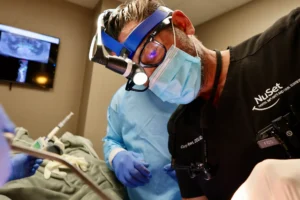Good dental health is essential for a happy and healthy life. Unfortunately, many people face dental issues that can affect their smile, comfort, and even their overall health. Among the various solutions available, “All-on-6” dental implants and crowns are popular choices, with both treatments offering unique benefits that can be tailored to meet the needs of patients.
In this article, we’ll explore the specifics of both All-on-6 dental implants and dental crowns. We’ll discuss what they are, the dental problems they can address, and their respective advantages.
What are All-on-6 Dental Implants?
All-on-6 dental implants are an advanced solution for extensive tooth loss. This treatment involves the placement of six implants in the upper or lower jaw, which serve as a foundation for a full arch of prosthetic teeth.
Unlike traditional dentures, All-on-6 implants are fixed in place, offering a more stable and permanent solution for those who have lost multiple teeth.
Advantages of All-on-6 Dental Implants
A significant advantage of All-on-6 implants is their stability. The implants are anchored directly into the jawbone, providing a secure base for the artificial teeth. This not only enhances the durability of the solution but also improves chewing ability.
Patients with All-on-6 implants can enjoy a wider range of foods, including harder and chewier items, without the discomfort or instability often experienced with dentures.
Another key benefit of All-on-6 is the natural look and feel it offers. The prosthetic teeth are designed to resemble natural teeth closely, both in appearance and function. This can greatly improve a patient’s self-esteem and comfort, as the implants feel more like natural teeth than traditional dentures.
When to Consider All-on-6 Dental Implants
All-on-6 dental implants are best suited for individuals who have experienced significant tooth loss. This treatment is particularly beneficial when most or all teeth in the upper or lower jaw are missing or the remaining teeth are not healthy enough to support dental crowns or bridges.
Getting All-on-6 implants begins with a thorough dental examination to ensure suitability for the procedure. This includes evaluating the health of the jawbone to determine the best implant treatment for you.
The procedure involves placing six implants strategically in the jawbone. These implants serve as anchors for a full arch of artificial teeth. After the implants are placed, a period of healing is necessary for the implants to integrate with the bone, a process known as osseointegration.
Patients need to understand that certain factors may influence eligibility for All-on-6 dental implants. These include the patient’s overall health, the condition of the jawbone, and habits like smoking, which can affect the healing process.
What are Dental Crowns?
Dental crowns are a type of dental restoration used widely in dentistry. They are custom-made caps placed over a tooth to restore shape, size, strength, and appearance.
The process of getting a crown involves preparing the affected tooth, taking an impression to create the custom crown, and then fitting the crown onto the tooth.
Crowns are ideal for addressing dental issues like damaged or decayed teeth. They can also be used to improve the appearance of misshapen or severely discolored teeth.
Advantages of Dental Crowns
One of the advantages of crowns is their ability to restore the functionality of a tooth. This includes improved chewing and biting abilities, which can be affected by damaged teeth.
Aesthetically, crowns are designed to blend seamlessly with your natural teeth, enhancing the overall appearance of your smile.
Types of Dental Crowns
Crowns can be made from different materials, each offering unique benefits.
- Porcelain crowns, also known as ceramic crowns, are popular for their natural look and compatibility with the human body. They are a good choice for front teeth due to their aesthetic appeal.
- Zirconia is a type of ceramic used to create crowns that are both durable and visually appealing. Many patients are opting for zirconia crowns because they offer a remarkably natural look and feel.
- Metal crowns, made from gold or alloys, are stronger and more durable, making them suitable for back teeth that endure more force from chewing. There are also porcelain-fused-to-metal crowns that combine the strength of metal with the natural look of porcelain.
Each type of crown is tailored to the patient’s specific needs, ensuring that the chosen solution is the best fit for their dental problem and lifestyle.
When to Choose Dental Crowns
Determining when to choose dental crowns is important for anyone looking to improve their dental health.
Crowns are typically the preferred treatment option when a tooth is damaged but not lost. This includes situations where a tooth is cracked, weakened by decay, or has a large filling. Crowns are also chosen for cosmetic improvements, like enhancing the appearance of a misshapen or discolored tooth.
The process of getting a crown starts with preparing the affected tooth. The dentist reshapes the tooth to create a suitable base for the crown. Then, an impression of the tooth is taken, which is used to custom-make the crown to fit perfectly. While the permanent crown is being made, a temporary crown might be placed to protect the tooth. Once the permanent crown is ready, it’s securely fitted over the tooth.
It’s important to note that crowns are a robust solution but require a healthy tooth structure for support. If the tooth is severely damaged or there is not enough tooth left to support a crown, other treatment options like dental implants might be considered.
Comparing Costs and Insurance Coverage
When considering dental treatments like crowns and All-on-6 dental implants, it’s important to understand the cost differences and insurance coverage options. Generally, the cost for each treatment can vary significantly based on factors like location, the material used, and the patient’s specific needs.
Dental crowns are typically less expensive than All-on-6 implants. A single crown costs $1000 at NuSet, but the total cost increases when multiple crowns are needed. It’s important to note that while crowns are more affordable in the short term, they may need to be replaced after some years, which can add to the overall cost over time.
On the other hand, All-on-6 dental implants represent a more significant initial investment. This costs $17,500-$25,500, including the surgical placement of the implants, the custom-made prosthetic teeth, and any necessary preparatory work, such as bone grafting. However, considering their durability and the fact that they can last for decades with proper care, All-on-6 implants can be a cost-effective solution in the long run.
Insurance coverage for these dental treatments can vary. Many insurance plans provide some coverage for dental crowns, especially when they are deemed medically necessary. However, coverage for dental implants can be more limited, as some insurance companies classify them as cosmetic procedures.
For those without insurance or facing high out-of-pocket costs, there are financing options available at NuSet Dental Implants. We also offer payment plans and work with third-party financing companies to make the treatments more accessible.
Need Help in Making a Decision? Schedule a FREE Consultation
Making the right decision between All-on-6 dental implants and dental crowns can be challenging. Every person’s dental situation is unique, and what works best for one person might not be ideal for another. The best way to determine the most suitable treatment for your specific dental concerns is to consult a qualified dentist.
Before your consultation, it’s helpful to prepare. Consider your dental history, current issues, and what you hope to achieve with the treatment. This information will help the dentist understand your needs and provide personalized advice.
During the consultation, don’t hesitate to ask questions. You should know about the dentist’s experience with the procedures, the expected timeline, the care needed after the treatment, and any potential risks or side effects. Also, inquire about the total cost, payment options, and what part, if any, is covered by insurance.
To help you remember, here’s a quick checklist of questions to ask during your consultation:
- Which option is best for my specific dental condition?
- What does the procedure involve?
- What is the recovery time and aftercare for each treatment?
- Are there any risks or side effects?
- What is the total cost, and what payment options are available?
- Does my insurance cover any part of the treatment?
If you’re ready to explore your options, consider scheduling a free consultation with us today to get started!
Frequently Asked Questions
Which is better, an implant or a crown?
Choosing an implant and a crown depends on your specific dental needs. A crown is often better for repairing a single damaged or decayed tooth, while an implant, particularly an All-on-6 implant, is suited for more extensive tooth loss. Your dentist can help determine the best option based on your teeth and jawbone condition.
What are the cons of All-on-6 dental implants?
While All-on-6 dental implants have many benefits, there are a few drawbacks. The procedure can be more invasive and requires a longer healing period than individual crowns. Not everyone is a candidate for All-on-6 implants; factors like bone density and overall oral health can impact eligibility.
How long does All-on-6 last?
With proper care and maintenance, All-on-6 dental implants can last many years, often decades. They are designed to be a long-term, durable solution for extensive tooth loss.
How much do All-on-6 dental implants cost in the US?
The cost of All-on-6 dental implants is an average of $20000 – $30,000 in the US, and this depends on factors like the dentist’s experience, geographic location, and any additional procedures required. It’s best to consult a dental professional for a detailed cost estimate based on your specific case.
Which is more expensive, crowns or implants?
Generally, individual crowns are less expensive upfront than All-on-6 dental implants. However, considering the longevity and overall benefits, All-on-6 implants can be a cost-effective solution in the long term. It’s important to evaluate both the immediate and future costs when making a decision.
Where can I get dental implants near me?
To get high quality dental implants, simply contact or visit the nearest NuSet Dental Implants clinic near you. Here are our convenient clinic locations:
- NuSet Dental Implants and Oral Surgery of St Louis
- 2821 North Ballas Road #225 St Louis, MO 63131 (Inside Town and Medical Building)
- Get driving directions
- NuSet Dental Implants and Oral Surgery of Scottsdale
- 8800 E. Raintree Dr Suite 170 Scottsdale, AZ 85260
- Get driving directions





